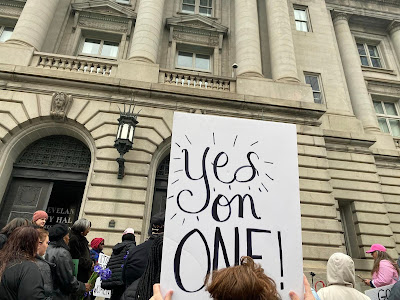Clevelandurbannews.com and Kathywraycolemanonlinenewsblog.com
Staff article
CLEVELAND,Ohio- Ohio voters, via Tuesday's closely watched general election, approved state ballot Issues 1 and 2, making abortion and recreational marijuana legal within the next 30 days and sending a message to Gov Mike DeWine and Republicans that women rule in Ohio. The Associated Press called the win for Issue 1 at about 9 pm Tuesday night.
Ohio is the 24th state to legalize recreational marijuana and was the 25th state to legalize medical marijuana.
" We won," said Women's March Cleveland head organizer Kathy Wray Coleman, also a longtime community activist and local Black journalist. "This is a day of reckoning for all those who sought to deny women in Cleveland and in Ohio their reproductive freedom and those who want to imprison Black people over a joint."
Coleman said that Women's March Cleveland will also make an impact on the 2024 election because national politics impact urban communities like Cleveland and national policies impact states such as the overturning of Roe v Wade with respective states gaining authority to regulate abortion. That authority is now gone and so is any other anti-choice legislation cooked-up by Ohio's Republican-dominated state legislature.
Both measures were carried heavily in Cuyahoga County, which includes Cleveland and is a county that is the second largest of Ohio's 88 counties and a Democratic stronghold that is 29 percent Black.
Cleveland's controversial ballot Issue 38, which pit a select group of community activists seeking a chunk of the city's funds, against City Council President Blaine Griffin, went down in defeat, opening the door for further conflict on what input community members in addition to city council members might have relative to the city budget. Issue 38 supporters say they want participation as to the city's budget and that the fight is not over.
Women's March Cleveland, Northeast Ohio's' largest grassroots women's rights group, made its last pitch before Ohio's Nov. 7 election on abortion ballot Issue 1 with a rally on the steps of Cleveland City Hall on Saturday, Nov 4, a diverse event that included community activists and elected officials as speakers as well as Councilman Kevin Conwell's FootPrints band.
Last year, on June 24, 2022, the U.S. Supreme Court, in the case of Dobbs vs Mississippi Health Organization, which was on appeal to the nation's highest court, overturned Roe v Wade, the court's 1973 landmark decision that made abortion legal Nationwide The court also gave individual states the authority to legislate abortion and reproductive rights not regulated by federal law, including to restrict or outright outlaw the procedure altogether. It, no doubt, caused a firestorm of protests throughout the country, including in Ohio, a pivotal state for presidential elections that has trended red in recent elections.
More than 14 states have near-total abortion bans during any point in pregnancy in effect, and at least six states have implemented abortions bans with other limits from six to 20 weeks bans. Ohio has a six-week abortion ban dubbed the heartbeat bill that is on hold per a judge's ruling as lawsuits over the controversial state law make their way through the courts. The passage of Issue 1 negates the heartbeat bill and any other anti- choice legislation.
Ohio became the seventh state in the country to vote on abortion rights behind Kansas, Michigan, Kentucky, Vermont, Montana and California. All those states had either proposals that enshrined the right to an abortion, or that allowed the state to regulate abortion.









